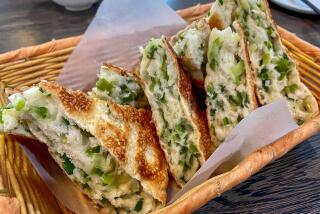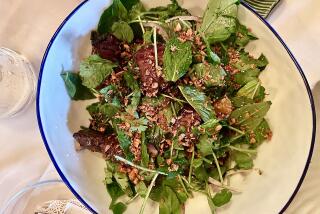Russians Flip Out Over Flapjacks as Lent Nears
- Share via
MOSCOW — Rio has its riotous Carnaval, New Orleans its bacchanalian Mardi Gras. Moscow has its own orgy of indulgence before the self-denial of Lent: Pancake Week.
The festival’s origins lie in an exultant farewell to winter that the Slavic tribes of Russia’s vast forested lands celebrated long before the arrival of Christianity. The ancient practices of burning straw figures and feasting on hot, golden, sun-shaped pancakes, or blini, were later adapted into Russian Orthodox customs.
Thus was born the celebration of Maslenitsa -- literally “Butter Week,” but more loosely and commonly translated as Pancake Week. Those seven calorie-packed days are enjoying fresh popularity, boosted by post-Soviet nostalgia for Russian traditions, a resurgence in Orthodox Christianity -- and support from the Moscow city government.
“As of Monday, Lent is starting. We’ll have to fast. So during this week, we can afford indulging ourselves in a bit of gluttony,” said Vera Bogdanova, 63, who stopped to buy the thin pancakes at a city-sponsored festival near the Kremlin and St. Basil’s Cathedral.
“I’ve been trying to stick to this pattern of celebrating Pancake Week since I was 10,” she added. “The celebration was that we would gather around a table and eat pancakes, because pancakes symbolize the advent of spring, and they symbolize the sun. They’re hot, they’re similar in color to the sun, they look like the sun. So we’re seeing winter off and we’re seeing spring in.”
In pagan times, historians say, the festival came at the spring equinox, when day and night are of equal length. Spring seemed to be just around the corner, even if the ground was still frozen and covered with snow.
After being Christianized, the festival was moved to fit into a weeklong slot between the last meat-eating day before Orthodox Lent and the long fast to Easter.
During this in-between week, the faithful can still eat fish and dairy products: butter, eggs, sour cream -- all the goodies that make nice blini, with their toppings ranging from honey to caviar. Gorging on pancakes became one last splurge, a way to use up these items before Lent prohibited their consumption. In other countries, Christians have traditionally feasted on pancakes on Shrove Tuesday, the day before Ash Wednesday.
The custom is so important that when President Vladimir V. Putin boarded the nuclear submarine Arkhangelsk last week to observe strategic military exercises, he inquired whether pancakes would be part of the crew’s rations. He was assured that they would.
The Russian news agency Itar-Tass even carried a report Wednesday on how Pancake Week might affect astronauts orbiting in the International Space Station. It quoted Lyudmila Gurova, head of an agency responsible for astronauts’ meals, as saying that the men on board could heat honey-flavored pastries and treat them as pancake substitutes, but that in the future, the real thing should be provided.
“We have already sent black caviar up there,” she said. “Now we have to think about pancakes.”
Specialists at the cosmonaut training center near Moscow, meanwhile, expressed hope to Itar-Tass, presumably tongue-in-cheek, that overconsumption this week of sweets by the one American and one Russian on board the station would not cause “irreparable damage” by making them gain too much weight before a spacewalk scheduled Thursday.
Having fun, after all, is a lot of what Pancake Week is all about.
University student Yulia Shavlovskaya, 18, dropped by the city-sponsored festival near St. Basil’s Cathedral two days in a row to enjoy pancakes and the carnival atmosphere, including comedy performances, amusement park games and rock and folk concerts. Today a giant straw figure known as Lady Maslenitsa, who holds a pile of pancakes in one hand, will be burned.
Shavlovskaya told of enjoying the week’s festivities as a child growing up in a Moscow suburb.
“We would get together with our friends. We’d make a wooden frame and put some clothes on it, and stuff it with various things like straw, and paint a face on it,” she recalled. “Then we’d pour gasoline and set it on fire, and then we’d run around it together with our parents.”
Pensioner Eduard Zarutsky, 69, may have been reaching back to centuries of tradition when he and his grandson, Maxim, made a stack of pancakes last week to share with the boy’s parents, but things weren’t entirely old-style. “We bought special pancake mix that’s easy to dilute with water, stir up and fry,” 13-year-old Maxim said.
Zarutsky insisted that the convenience did nothing to damage the custom.
“They taste absolutely normal,” he said. “They’re quite OK pancakes -- delicious.”
He admitted, however, that he had friends coming for pancakes the next day, and that for them, he would be using a traditional recipe. “I’m going to make some yeast-based pancakes for my friends and treat them to it,” he said. “They didn’t have any quick mixes centuries ago.”
More to Read
Sign up for Essential California
The most important California stories and recommendations in your inbox every morning.
You may occasionally receive promotional content from the Los Angeles Times.













